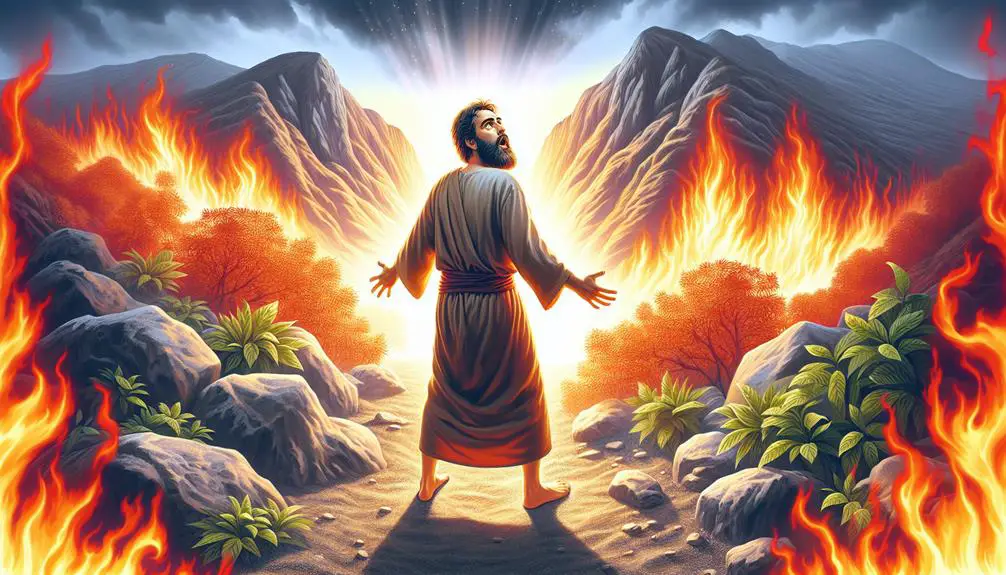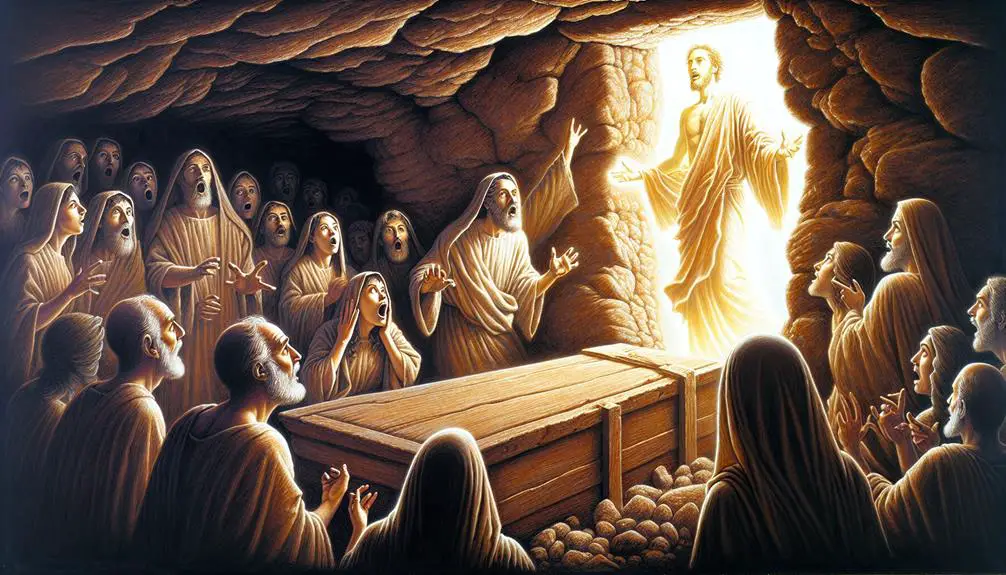Discover the transformative power of biblical awakenings and how they mirror our quest for purpose today.

Awakening in the Bible
Imagine you're standing beside Moses as he encounters the burning bush, an event marking a profound awakening in his life and mission. This isn't just about a bush that doesn't burn up; it's a pivotal moment of realization and divine calling.
The Bible is rich with such awakenings, from Jonah's deep-sea intervention to Paul's blinding revelation on the road to Damascus. Each story carries a unique message about transformation, purpose, and faith.
But what's truly fascinating is how these ancient awakenings resonate with our modern lives, challenging us to consider our own moments of realization. What might your burning bush moment look like? Let's explore this further.
Key Takeaways
- Biblical awakenings often signify transformative spiritual journeys triggered by divine intervention.
- These narratives explore themes of faith, redemption, and the promise of eternal life.
- Miraculous events within these stories underscore the sovereign power of God over life and death.
- Personal and collective challenges to faith serve as catalysts for profound spiritual growth and renewal.
The Prodigal Son's Return

The narrative of the Prodigal Son's return profoundly illustrates the transformative power of forgiveness and redemption within familial and spiritual contexts. This parable, rich in its depiction of family reconciliation, confronts the audience with the consequences of financial recklessness while simultaneously offering a path to restoration and healing. You're invited to delve into the layers of this story, recognizing its relevance not only in ancient texts but also in contemporary discussions about the dynamics of forgiveness and the rebuilding of trust after betrayal.
Financial recklessness serves as the catalyst for the younger son's journey towards self-awareness and repentance. His extravagant spending, a vivid illustration of youthful imprudence, leads to his inevitable downfall. Yet, it's this very act of squandering his inheritance that sets the stage for his eventual enlightenment and desire to return home. The narrative skillfully navigates the complexities of human nature, highlighting how adversity often precedes growth and renewal.
Family reconciliation emerges as the central theme when the prodigal son is embraced by his father, symbolizing the unconditional love and forgiveness that are foundational to familial bonds. This reunion isn't merely a personal victory for the son but a profound lesson on the power of grace and second chances. It challenges you to consider the depth of forgiveness you're capable of extending towards others, especially within the framework of family relationships where hurt can run deep.
In this analysis, it's evident that the parable of the Prodigal Son's return transcends its historical and cultural origins, offering timeless insights into the human condition, the pitfalls of financial recklessness, and the redemptive potential of family reconciliation.
Jonah's Wake-Up Call

Moving from the familial and financial lessons of the Prodigal Son, we encounter Jonah's wake-up call, a narrative that underscores the consequences of evasion and the inevitability of divine intervention in guiding human actions. Jonah's story serves as a profound exemplar of the lengths to which divine forces will go to realign an individual with their destined path. This tale isn't just about disobedience; it's a vivid illustration of divine intervention steering a fate astray back onto its intended course.
You'll find that Jonah's reluctance to follow divine command leads him into an oceanic ordeal, a literal storm that serves as a metaphor for the turmoil within. The tempest isn't just a punishment but a pivotal point in Jonah's spiritual journey. It represents a divine strategy to awaken Jonah to his responsibilities. The oceanic ordeal is both a physical and existential confrontation, compelling Jonah to face the consequences of his choices.
The intervention doesn't stop with the storm; it extends to Jonah's time in the belly of the whale. This isn't merely a miraculous survival story but a moment of introspection and transformation. It's here, in the depths of despair and isolation, that Jonah confronts his defiance and realizes the futility of running from divine purpose.
Jonah's story teaches you that divine intervention isn't merely about correction but about awakening to one's true calling. It's a reminder that evasion might lead to an oceanic ordeal, but the purpose behind it's to guide you back to your divine path.
Moses at the Burning Bush

In a moment that forever altered the course of biblical history, Moses encountered God through the spectacle of a burning bush, a pivotal awakening to his divine mission. This Divine Encounter not only marked Moses' transformation from a shepherd to a prophet but also symbolized the inception of a covenantal relationship between God and the Israelites. The narrative, rich in symbolism and theological significance, invites a closer examination of its elements.
- Symbolism of the Burning Bush: The bush that burns without being consumed represents the enduring and holy presence of God. It signifies that God is in the midst of his people during their suffering in Egypt, offering hope and a promise of deliverance.
- The Concept of Sacred Ground: When Moses is instructed to remove his sandals because he's standing on sacred ground, it underscores the sanctity of the divine presence and the importance of reverential approach towards God. This moment emphasizes the separation between the holy and the profane, inviting the believer to recognize and respect the sacredness of divine encounters.
- Moses' Reluctance and God's Assurance: Moses' hesitation to accept his mission reflects human doubt and fear in the face of divine calling. God's response, providing signs and assurances, highlights the theme of divine support and guidance throughout one's mission. This interaction showcases the dynamic relationship between human agency and divine will.
This event on the sacred ground not only signifies a personal awakening for Moses but also serves as a foundational moment for the collective identity and destiny of the Israelites.
Paul's Road to Damascus

How does Paul's transformation on the road to Damascus redefine the concept of divine intervention and personal rebirth within the Christian tradition? Saul's conversion, not only a pivotal moment in his life but also a cornerstone of Christian doctrine, offers a profound narrative on transformation and redemption. On his Damascus journey, Saul, a fervent persecutor of Christians, encounters a divine intervention so powerful it not only blinds him physically but also illuminates the spiritual truth, leading to his rebirth as Paul, an apostle of Christ.
This event emphasizes the theme of awakening in the Bible, showcasing how divine grace can transform even the staunchest adversaries into devout followers. It brings to light the unpredictable and often sudden nature of spiritual awakening, underscoring the idea that enlightenment and redemption are accessible to all, irrespective of their past.
Aspect |
Significance |
|---|---|
Divine Intervention |
Highlights the active role of the divine in human transformation. |
Personal Rebirth |
Illustrates the possibility of complete personal transformation and redemption. |
Saul to Paul |
Symbolizes the death of the old self and the birth of a new identity in faith. |
Spiritual Awakening |
Represents a sudden and profound understanding of spiritual truth. |
Universal Accessibility |
Affirms that divine grace and redemption are available to everyone, regardless of their past actions or beliefs. |
In analyzing Paul's road to Damascus, it's clear that his conversion is not just a personal narrative of transformation but also a theological blueprint that communicates the power of faith, the possibility of redemption, and the inclusivity of divine grace. This event not only redefines but also enriches our understanding of divine intervention and personal rebirth within the Christian tradition.
Lazarus Rises From Death

Examining the resurrection of Lazarus unveils another layer of divine intervention, demonstrating the power of Jesus's command over life and death. This biblical narrative, more than a mere recount of a miraculous event, serves as a profound lesson on mortality acceptance and the omnipotence of divine will. Through this act, Jesus not only asserts His authority over the physical world but also provides a compelling testament to the promise of eternal life for those who believe.
The story of Lazarus is rich in symbolism and theological implications:
- Divine Intervention: The act of raising Lazarus from the dead is a direct intervention by the divine into the natural order, highlighting the belief that life and death are under God's sovereign control.
- Mortality Acceptance: Lazarus's resurrection serves as a pivotal narrative that encourages believers to accept their mortality with the hope of eternal life. It's a reminder that death isn't the end but a transition into a new existence under divine care.
- Faith and Doubt: The reactions of Martha, Mary, and the onlookers encapsulate the human struggle between faith and doubt. Their journey from despair to belief upon witnessing Lazarus's return from the dead mirrors the spiritual awakening that follows the recognition of divine power and grace.
The resurrection of Lazarus isn't just an account of a miraculous awakening from physical death; it's a theological exploration of life, death, and the transformative power of faith. It challenges you to consider the implications of divine intervention and the acceptance of mortality from a position of faith and hope.
Frequently Asked Questions
How Does the Concept of Spiritual Awakening Differ Between the Old Testament and the New Testament?
In comparing spiritual awakenings, you'll find the Old Testament emphasizes prophetic dreams and covenant renewal, serving as direct communications from God. These moments often guided individuals or nations towards a renewed faithfulness.
Conversely, the New Testament shifts focus, presenting spiritual awakening through personal transformation and the Holy Spirit's indwelling. This transition highlights a more intimate and individualized relationship with the divine, reflecting the evolving nature of spiritual understanding.
Are There Any Examples of Group Awakenings in the Bible, Where a Community or a Nation Experienced a Collective Spiritual Revival?
Absolutely, you'll find that the Bible is bursting at the seams with stories of entire communities being hit by a tidal wave of spiritual revival.
It's not just about individual conversions; it's about prophetic visions sparking collective transformations. Think of it as entire nations suddenly snapping awake in a deeply profound sense.
These moments aren't just fleeting; they're pivotal, reshaping the spiritual landscape and setting a new course for generations.
In What Ways Do Biblical Awakenings Influence Modern Christian Practices and Beliefs About Spiritual Renewal?
You'll find that awakenings deeply shape modern Christian practices and beliefs about spiritual renewal. These historical episodes underscore the importance of personal transformation within faith communities.
By examining these movements, you can see how awakening rituals have been integrated into contemporary worship and prayer life, fostering a culture that values profound spiritual reawakening.
This analysis highlights the lasting impact of these awakenings on how believers today pursue and experience spiritual growth.
How Do Non-Canonical Texts, Such as the Apocrypha, Address the Idea of Awakening or Spiritual Enlightenment?
You're exploring how non-canonical texts, like the apocrypha, delve into awakening or spiritual enlightenment. These texts often offer Gnostic insights and esoteric interpretations, providing a unique perspective on spiritual awareness.
They challenge mainstream beliefs, encouraging a deeper, more personal exploration of faith and understanding. Through their narratives and teachings, you're invited to consider the multifaceted nature of spiritual enlightenment, beyond traditional biblical narratives.
Can the Process of Awakening in the Bible Be Compared to Similar Concepts Found in Other Major World Religions?
You're exploring how awakening concepts in major world religions mirror each other. For instance, Eastern philosophies often emphasize meditation practices for spiritual enlightenment, akin to biblical awakenings. This comparison highlights a universal quest for spiritual depth across cultures.
Analyzing these parallels, it's evident that the pursuit of enlightenment, whether through meditation or biblical teachings, showcases a shared human aspiration for understanding and connecting with the transcendent. This analysis bridges diverse spiritual traditions.
Conclusion
In traversing the landscapes of biblical awakenings, you've journeyed through tales where divine interventions and personal epiphanies converge, illuminating the path from darkness to enlightenment.
Like seeds germinating in the soul's fertile ground, these narratives sprout insights into the human condition, intertwined with the divine tapestry. They serve not merely as historical accounts but as beacons, guiding us through our existential mazes.
Herein lies the quintessence of transformation—where every heart, akin to Lazarus, is summoned from its slumber, to rise and embrace the dawn of spiritual rebirth.



Sign up